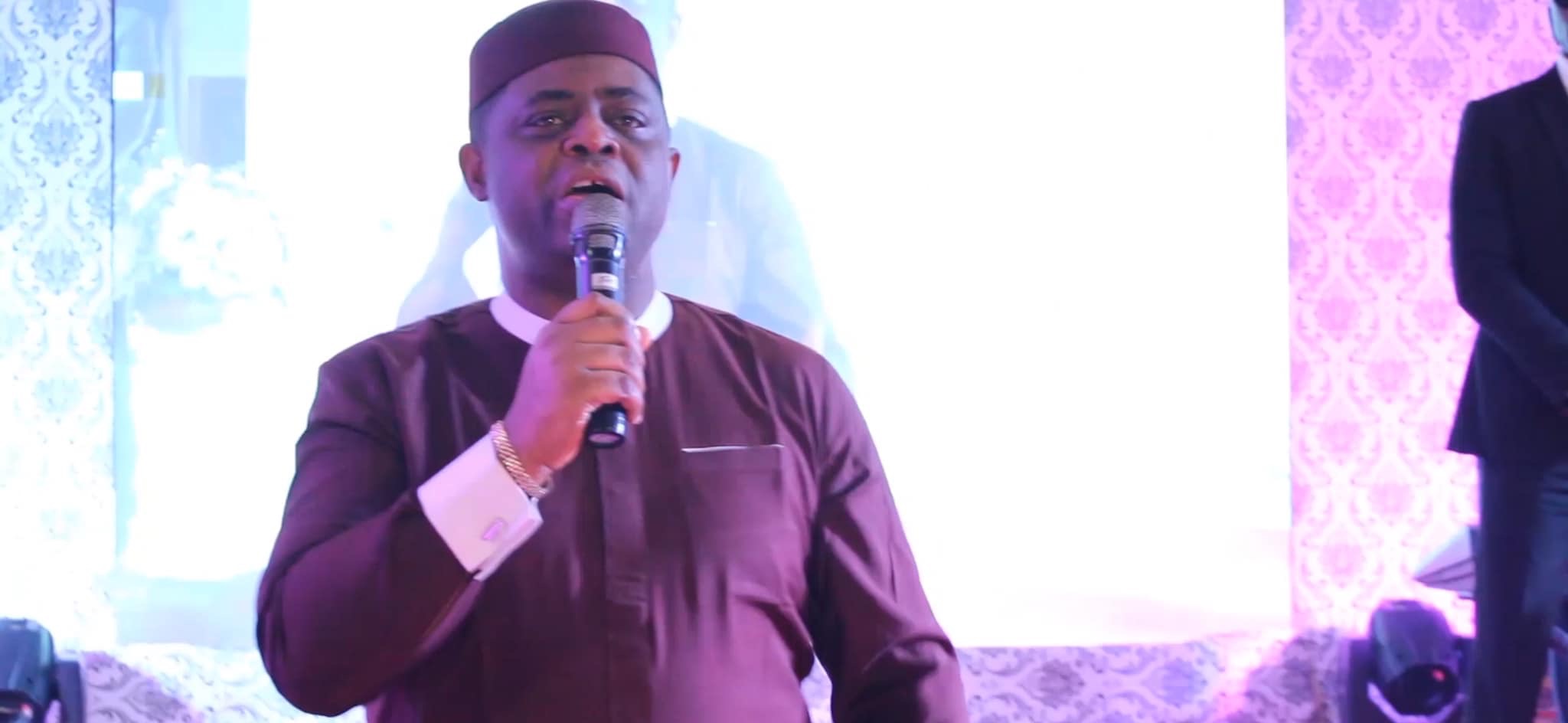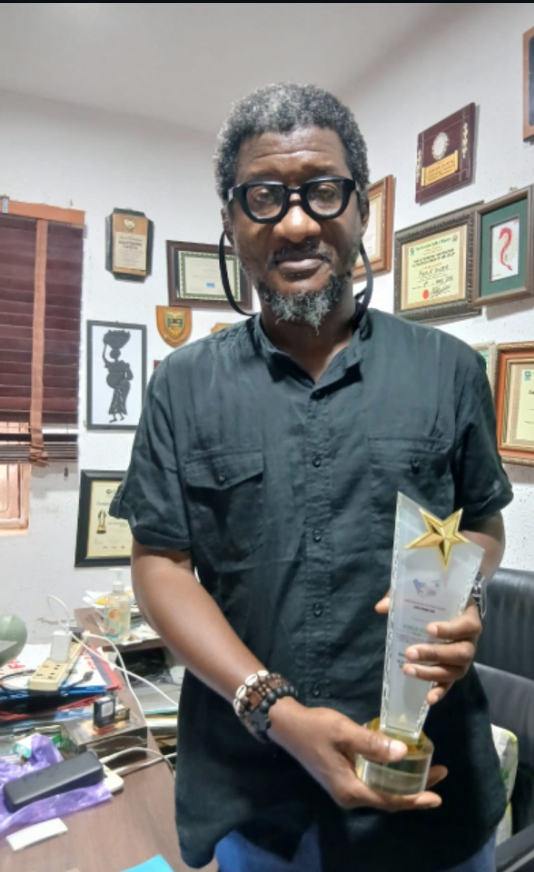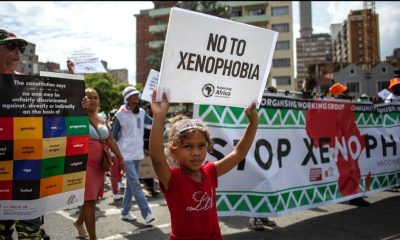celebrity radar - gossips
A WARNING FOR THE FOREIGN MINISTER AND PEOPLE OF SOUTH AFRICA BY FEMI FANI-KAYODE

“I would appreciate them in helping us as well to address the belief our people have and the reality that there are many persons from Nigeria dealing in drugs in our country”- Dr. Grace Naledi Mandisa Pandor, South African Minister of International Relations.
Is this the sort of thing that ought to be said by the South African Government when we are still in mourning and when we have not even buried our compatriots that were cruelly slain, bludgeoned to death and cut to pieces in the streets of South Africa?
At a time when this irresponsible, insensitive, shameless, conflicted, self-hating, pitiful and mendacious creature that calls herself the Foreign Minister of South Africa should be apologising to the Nigerian people for the mindless savagery and barbarity of her blood-crazed compatriots, she is pointing accusing fingers at their victims and the objects of their collective hate and seeking to demonise them. What have we done to deserve this? First you kill us then you seek to justify it and criminalise us!
Does this she-devil of a Foreign Minister really believe that innocent Nigerian men, women and children should be butchered at will in the streets of South Africa by bloodthirsty and bestial mobs?
Worse still does she think it is right and proper that this is done with the full endorsement and support of both the South African Government and police? Is that the way forward? Is that the way to build bridges in Africa and enhance peace and stability on the continent?
Can such behaviour be justified or defended under any circumstances? What would she do or think if the Nigerian Government and people decided to reciprocate and mete the same treatment out to South Africans that reside in Nigeria and South African companies that are situated here?
In any case how many of those that were butchered over the years were drug dealers? If it is true that as many Nigerians deal in drugs as she has suggested, why can’t the South African Government apprehend, arrest and prosecute them and send them to jail rather than demonise, misrepresent, target and kill innocent and defenceless Nigerians?
This is a clear case of racial stereotyping and a squalid and shameful attempt to justify hate, racism, xenophobia, self-hate, black on black violence and mass murder. Permit me to educate the South African Foreign Minister and to set the record straight.
There are thousands of Nigerian professionals, academics, lecturers, intellectuals, businessmen, teachers, scientists, engineers and doctors in your country working hard, doing a great job and contributing massively to your development and economy.
The fact that your people hate Nigerians and enjoy killing us has nothing to do with drugs, human-trafficking or drug-trafficking. It is because your people are hateful, ignorant, xenophobic, lazy, racist and envious of ours.
And the few irresponsible Nigerians that go to South Africa and indulge in terrible and unforgivable crimes like drug and human-trafficking and gang-related violence do so only because your people have a terrible weakness, an undue fascination and an insatiable appetite for hard drugs, alcohol, prostitues, men and women of easy virtue and the dark, ugly and wild side of life.
It is therefore not surprising that South Africa has, for the better part of the last 25 years, been described as the “world’s capital for homicide” and the country with the “highest number of people that have been afflicted with HIV AIDS!”
Rather than work hard, like their Nigerians counterparts, South Africans prefer to go to sleazy and cheap nightclubs, to gamble on gaming machines and poker tables, to drink huge amounts of beer, to take massive amounts of hard drugs and to stay at home, watch television and sleep. They are not particularly good at anything except singing beautiful songs and killing their fellow Africans.
It is for this singular reason that their women love and respect Nigerian men and have nothing but contempt for their own. Generally-speaking Nigerian men are strong, productive, virile, focused, courageous, industrious, adventurous and hard-working with a touch of arrogance and they excel in all their ways. Sadly the average South African male does not possess these virtues or qualities.
It does not stop there. For the better part of the last 50 years Nigeria has been the major military and economic power in Africa and we have used our wealth, power and influence wisely and expeditiously to the advantage of many countries on the continent.
For example, had it not been for us the minority white Boers would still be ruling over the black South Africans and apartheid would still have been firmly in place.
We nationalised British Petroleum and Barclays Bank because of them in the late 1970’s and thereby compelled the British to accept our demand of black majority rule in South Africa and Zimbabwe and to stop supporting apartheid and white minority governments.
We are far ahead of South Africa in terms of education and virtually every other sphere of human endeavour and we have opened up our country for them to come and invest in without any pre-conditions, obstacles or trade barriers.
Today Nigeria is by far the biggest market for their expertise, products, goods and services and if that market were to ever be closed to them or if their companies were nationalised it would affect their economy enormously.
The truth is that they benefit far more from and make far more money from us today than we benefit and make money from them.
In a trade war they have far more to lose than we do because not that many Nigerian companies have invested heavily in and operate in South Africa whilst many South African companies have invested heavily in and operate in Nigeria.
As a matter of fact some of those companies make more money from the Nigerian market and their Nigerian operations than they do in the whole of the rest of Africa put together.
That is what we have offered and given them and yet they have offered and given us next to nothing in return. All we get from them are insults, violence and heartache!
Historically and in every other way they are very much our juniors. Our people were educated at Oxford, Cambridge and the very best universities in the world since 1860. South African blacks never went to a real university until the 1990’s after aparthied fell.
We have liberated and brought peace, justice and stability to many African countries and been a blessing to the African continent for many decades despite our present challenges.
Whether it be Angola, Mozambique, Congo, Zimbabwe, South Africa, Tanzania, Uganda, Zambia, Ethiopia, Eritea, Ghana, Namibia, Sierra Leonne, Liberia, Sao Tome and Principe, Sudan, Chad, Niger and so many others, we were there in full force with our money, our resources, our arms, our logistical support, our oil, our economic concessions, our aid and in some cases our troops.
We shed blood and our blood was shed for other African countries over the years yet all we get in return are insults.
If you say Nigerians are drug pushers and human traffickers then I will say that South Africans are losers, racists, drop-outs, failures and genocidal maniacs.
Worse still had the white Boers not built up South Africa it would still be a barren land and the black population would still be nothing but slaves that live in filthy and squalid little townships.
Despite all the razzmatazz and great public relations about being a happy and prosperous “rainbow nation” where everyone is so happy and is treated so well, the truth is that South Africa remains a country with a black body and a white head.
I say this because even though political control and leadership has been ceded to the blacks, 80% of the multi-national corporations, big business, industry, the private sector and the economy and 90% of the choicest land, the biggest farms and the best farmlands still remain in the hands of the white Boer minority.
Given this, is it any wonder that black South Africans are literally going mad and are deeply frustrated and filled with hatred and bitterness?
They have nothing and, unlike in the days of Oliver Tambo, Nelson Mandela and Thabo Mbeki (all great and inspiring men of strength, courage, wisdom, conviction and profound wisdom) other than a handful of new political leaders who are essentially corrupt, weak, fearful, divided, conflicted and uninspiring token niggers and Uncle Toms (with the possible exception of a bright, courageous and rising young star by the name of Julius Malema), their prospects of ever amounting to anything over the next 100 years is very dim.
The real power still resides in the hands of the minority white Boers and the prospects for a prosperous and bright future lies heavily in their favour at the expense of the majority blacks.
If only the South Africans knew and remembered their history and considered ours they would be praying for Nigeria and thanking us every day rather than insulting and killing us.
Without our support and the pressure we brought to bear, the great Nelson Mandela may never have been freed and the ANC and its armed wing (Umkhonto Wi SIzwe) would not have received the massive and robust funding and support that it did throughout the 1960’s, 1970’s and 1980’s.
Together with the Cubans and the Libyans, Nigeria did more for the liberation of South Africa and South African majority rule than any other nation in the world.
What the South Africans are doing to Nigerians today makes me regret the fact that we did so much for them in the past.
They have repaid our good with evil and consequently evil will never leave their doorstep. They have shed our blood for no just cause and the heavens will respond and avenge us. They have made us weep and shed tears for our compatriots and for this they shall pay a heavy price!
The South African Foreign Minister and those that share her racist and deplorable disposition and xenophobic views should consider these facts and the implications of her words and actions before she ventures to open her fat, ugly and very undiplomatic mouth to speak untruths and garbage about Nigeria and Nigerians again.
Failing to do so may provoke a series of cataclysmic events and unpredictable and harsh reprisals which would result in the final demystification and total humiliation of the “rainbow nation” and the painful and everlasting disgrace of its people.
Make no mistake about it, even a Nigeria in her weakened state and with all her challenges is still big and strong enough to bring South Africa to its knees.
And if the killing and mass murder of our people does not stop that is precisely what we shall do. A word is enough for the wise.
Permit me to conclude this contribution with the following.
Many years ago in the early to mid-1970’s, when apartheid was alive and well in South Africa and when I was a young student at Harrow, which undoubtedly remains the best private school in England, I broke the jaw of a blond, blue-eyed English-speaking white South African fellow student who said some very nasty things about black South Africans during a history class.
During a heated debate about racial segregation and the South African Mixed Race Act which made it a criminal offence for blacks and whites to get married or have sexual relations, he got up and said, before the entire class, that
“allowing those dirty black dogs to touch our beautiful and pure white women is sacrilage. It is against the laws of God! It is like getting a monkey to mate with a human being!”
Finally he said “no sane white woman would ever want to have sex with a black African monkey and any of them that do should be sent to jail”.
I reacted swiftly and without any hesitation. Without any warning or even words of anger, I left my desk, walked up to him and broke his jaw with one clean blow from my right fist. He never knew what hit him!
I remember hearing and enjoying the way his jaw popped open and cracked. It was a strange noise and as he hit the floor his legs started to shake uncontrollably after which he lost consciousness.
For one horrendous moment I thought I had killed him but thankfully eventually his eyes opened, he sat up and he was rushed to the hospital on a stretcher.
He hailed from one of the biggest and richest white families in South Africa who were (and still are) in the diamond mining business. I almost got expelled from Harrow for my “wild and unruly” behaviour until I gave my reasons for hitting him to the school authorities.
They were shocked and equally appauled by what he had said, which they rightly regarded as a grave and reckless provocation, and they decided to let me off the hook.
I was reprimanded and warned and I remember that the Headmaster wrote a formal letter about the incident to my father who was livid with me for jeopordising my entire academic career simply because of a racial slight and slur.
Papa said “you didn’t have to hit him and almost kill the poor boy: you could have just attempted to educate him in a civilised manner and at the worst insult him back!”
Yet I had no regrets or remorse about my course of action or the choice that I made and to my eternal credit I never apologised for my action to the South African, the school authorities, my father or anyone else.
The truth is that I was proud of what I did and I believed that defending the honor of my black South African colleagues was far more important than staying at Harrow. I was prepared to risk it all by physically assaulting the white boy and I did it with relish.
My gamble paid off and the South African boy, as sober as ever, never insulted or spoke ill of blacks again in my prescence.
As a matter of fact we ended up becoming friends in the following years and I will never forget what he told me just before we left Harrow in 1977. I remember the words because I wrote them down at the time and have meditated on them for years.
He said “you don’t understand the Bantus” (meaning black South Africans).
He went on to say “the day they get power in South Africa is the day that South Africa will begin to die. Since the 17th century we Boers built up everything there and they contributed nothing. We fought the Zulus and later the British and we built and developed that land with our flesh, sweat and blood. Giving a country like South Africa to them is like giving a monkey a loaded gun. They will use it to kill everyone around them and eventually they will kill themselves. They are not like you Nigerians: they have no history or class. They are unenlightened, ungrateful, primitive, uncouth and very backward and one day the rest of Africa will know them for what they are!”
Judging from the words of the South African Foreign Minister and the xenophobic and racist diposition of the South African President, Government and people, it appears that that day has finally come.
celebrity radar - gossips
Kevin David Kaydee Releases Inspiring Single “Oluwa Settle Me”

Kevin David Kaydee Releases Inspiring Single “Oluwa Settle Me”
Rising music artist Kevin David Kaydee has released a powerful new single titled Oluwa Settle Me, a soulful Afro-inspired anthem that blends heartfelt prayer with modern rhythm.
“Oluwa Settle Me” captures the everyday cry of many believers seeking breakthrough, peace, and divine favour. With emotionally rich melodies and uplifting instrumentation, the song expresses a sincere plea to God for complete answers to life’s pressing questions—career, destiny, relationships, and spiritual fulfilment.

Drawing from Afrocentric sounds and contemporary gospel influences, the track stands out for its simplicity, sincerity, and spiritual depth. Kevin David Kaydee delivers the message with passion, creating a worshipful atmosphere that resonates across age groups and cultures.
The song’s message of hope and dependence on God positions it as more than just music,it is a prayer set to melody. By fusing spirituality with modern lifestyle rhythms, “Oluwa Settle Me” reflects the growing wave of gospel music that speaks directly to real-life struggles while pointing listeners back to faith.
As gospel music continues to evolve across Africa and beyond, Kevin David Kaydee’s latest release reinforces music as a powerful tool for encouragement, reflection, and spiritual connection.
“Oluwa Settle Me” is now gaining attention among gospel music lovers for its relatable message and soulful sound, marking another significant step in the artist’s growing musical journey.
celebrity radar - gossips
Another Feather for Nollywood Icon Fidelis Duker

**Another Feather for Nollywood Icon Fidelis Duker
*Lagos, Nigeria* — In a remarkable celebration of artistic achievement, renowned Nollywood figure Fidelis Duker received yet another prestigious accolade last weekend, solidifying his role as a key player in the growth of the Nigerian and African film industries. The award was presented in a ceremony held at Duker’s Lagos office by esteemed film and theatre director, Mr. Alex Eyengho, founder of the Warri International Film Festival, alongside Marketing and Strategy Director, Mrs. Matel Eyengho.
The recent recognition builds upon Duker’s previous achievement at last year’s ECOFEST in Dakar, where he was honored with a Lifetime Achievement Award. This latest accolade is a testament to his unwavering dedication and substantial contributions to the cinematic landscape.
“I am truly humbled by this recognition,” Duker expressed during the event. In his speech, Alex Eyengho lauded Duker’s pioneering efforts in establishing significant film festivals in Nigeria, particularly the Abuja International Film Festival, which has played a vital role in promoting local talent and storytelling.
Eyengho emphasized, “Fidelis has not only paved the way for emerging filmmakers but has also helped elevate Nigerian cinema on the global stage. His creative vision and commitment inspire all of us in the industry.”
As Duker reflects on this honor, he acknowledges the importance of teamwork and collaboration in achieving success. “This acknowledgment reaffirms to my team and me that our work is being observed, and it motivates us to continue contributing to the development of our sector,” he stated.
With numerous projects on the horizon, Duker remains a relentless advocate for the growth and recognition of African cinema. His latest recognition is yet another testament to the vibrant and evolving landscape of Nollywood, as industry leaders like him continue to inspire future generations.
As the film industry anticipates the next phase of development, Duker’s continued influence signals a promising future for filmmakers in Nigeria and across the continent.
celebrity radar - gossips
E‑Money’s Grand Gesture: A Closer Look at the SUV Gift to Chinedu “Aki” Ikedieze

E‑Money’s Grand Gesture: A Closer Look at the SUV Gift to Chinedu “Aki” Ikedieze
By George Omagbemi Sylvester | Published by SaharaWeeklyNG
“Public Generosity, Celebrity Loyalty and the Symbolism of Wealth in Nigeria’s Entertainment Elite.”
On Tuesday, February 17, 2026, Nigerian billionaire and entrepreneur Emeka Okonkwo, widely known as E‑Money, once again captured national attention with a lavish and highly publicised act of generosity, gifting a brand‑new 2024/2025 Ford SUV to veteran Nollywood actor Chinedu Ikedieze, affectionately called Aki, during his high‑profile birthday celebration.
The event, held in Lagos amidst a constellation of entertainers, business figures and socialites, was itself part of an annual tradition in which E‑Money marks his birthday (on February 18) with large‑scale giveaways and spectacular shows of material philanthropy. This year, he announced the gift of over 30 cars to friends, staff and family, a gesture that quickly went viral as videos and images circulated across social media platforms.
In the case of Ikedieze, E‑Money’s gift appeared to be deeply personal. During the festivities, E‑Money stood beside his elder brother, Grammy‑nominated musician KCee and recounted how Ikedieze stood by him at his 2007 wedding. The billionaire explained that the SUV was a “token of appreciation” for the enduring support the actor had shown over the years which is a narrative that blends friendship with public celebration.
Ikedieze, a Nollywood staple with a career spanning more than two decades and over 150 film credits, including the iconic Aki na Ukwa franchise, visibly reacted with humble surprise as he received the vehicle, bowing his head in respect and gratitude. The actor later shared the moment on his Instagram account with a caption celebrating the gift, further fuelling online engagement around the event.
Beyond the spectacle, this incident underscores evolving dynamics in Nigerian celebrity culture and the intersection of wealth, influence and reciprocity. Sociologist Dr. Chinedum Uche of the University of Lagos, speaking on the broader implications of such high‑profile gifts, notes: “Philanthropy that is highly publicised can reinforce social bonds, but it also reflects a culture where generosity is intertwined with reputation economy; where giving becomes as much a social signal as it is an act of kindness.” The quote highlights how public acts of wealth transfer among elites serve layered social functions that extend beyond pure altruism.
Critics of such displays argue that ostentatious giveaways, particularly in a country with stark economic disparities, risk amplifying social envy and exacerbating perceptions of inequality. Economist Dr. Ifunanya Nwosu from the Lagos Business School observes: “In societies marked by economic stratification, celebrity largesse may inspire admiration, but it can also inadvertently highlight structural inequities; prompting questions about systemic investment in public welfare versus individual generosity.”
Still, supporters maintain that E‑Money’s annual tradition (which has in past years included cash gifts to his brother KCee, comedians and even domestic staff) reflects genuine gratitude and a commitment to uplifting his immediate circle, albeit within the private sphere.
For Ikedieze, the SUV stands both as a heartfelt gesture from a longtime friend and a public affirmation of their enduring relationship. As the video of the moment continues to circulate, the broader narrative has ignited discussions about the role of private wealth in public life, celebrity culture and how acts of giving are interpreted in contemporary Nigerian society.
In a landscape where influence and generosity often play out in equal measure on public stages, E‑Money’s gift to Aki is more than a headline, it is a flashpoint in ongoing debates about wealth, friendship and visibility in Nigeria’s entertainment and entrepreneurial ecosystem.
-

 celebrity radar - gossips6 months ago
celebrity radar - gossips6 months agoWhy Babangida’s Hilltop Home Became Nigeria’s Political “Mecca”
-

 society6 months ago
society6 months agoPower is a Loan, Not a Possession: The Sacred Duty of Planting People
-

 society5 months ago
society5 months agoReligion: Africa’s Oldest Weapon of Enslavement and the Forgotten Truth
-

 news6 months ago
news6 months agoTHE APPOINTMENT OF WASIU AYINDE BY THE FEDERAL GOVERNMENT AS AN AMBASSADOR SOUNDS EMBARRASSING









You must be logged in to post a comment Login